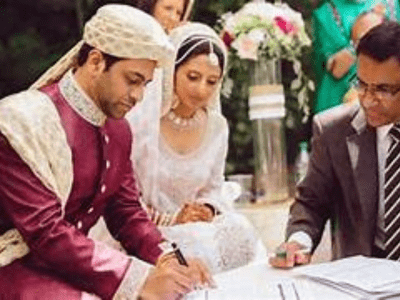A Guide to the Islamic Nikah Process: From Proposal to Vows
Embarking on the sacred journey of Islamic Nikah involves meticulous steps, each infused with spiritual significance. It begins with a heartfelt proposal, progresses to family discussions and mutual consent, and formalizes through the drafting of the Nikah Nama. The selection of witnesses ensures the authenticity of the ceremony. Quranic verses set the spiritual tone, leading to the exchange of vows (Ijab and Qubul), where the bride and groom affirm their commitment. The process culminates with a supplication, seeking Allah’s blessings for the newlyweds, making every step a meaningful progression toward a blessed union.
Understanding the Essence of Islamic Nikah
Islamic Nikah transcends a mere contractual agreement, delving into the profound essence of love and faith. Rooted in the divine principles of Islam, Nikah symbolizes a spiritual journey where two souls come together with the blessings of Allah. It is a commitment made in the name of love, understanding, and shared values. The essence lies in acknowledging Allah’s presence weaving spirituality into the fabric of the marital union. Islamic Nikah is a testament to the sacredness and depth of commitment that defines Muslim matrimony.
The Benefits of Islamic Nikah
The benefits of Islamic Nikah extend far beyond the joyous union of two individuals; they encompass a holistic approach to life and family. Rooted in the principles of Islam, Nikah provides a framework for building a harmonious and stable family unit. It fosters a sense of commitment, mutual respect, and shared responsibility between spouses. Through the divine blessings invoked during the ceremony, Islamic Nikah seeks Allah’s guidance for the couple’s journey, ensuring a spiritually grounded foundation. Additionally, Nikah promotes the values of love, compassion, and understanding, creating an environment conducive to personal growth and familial well-being. It safeguards against societal challenges, emphasizing the sanctity of the marital bond and contributing to the broader social fabric within the Islamic community.
Islamic Nikah Services
Islamic Nikah services offer a comprehensive and culturally sensitive approach to facilitating the sacred union of couples within the Muslim community. These services typically include guidance on the entire Nikah process, from initial consultations to drafting the Nikah Nama (marriage contract). Officiants, well-versed in Islamic traditions, lead the ceremonies, ensuring adherence to religious customs. With a focus on spirituality and cultural respect, Islamic Nikah services contribute to the seamless and meaningful celebration of marriage within the framework of Islam.
Guidance Through the Nikah Process
Islamic Nikah services offer invaluable guidance to couples embarking on their marital journey. These services provide expert advice and support from the initial stages of proposal discussions to the formalization of the marriage contract (Nikah Nama). Officiants well-versed in Islamic traditions help couples navigate the cultural and religious aspects of the Nikah process, ensuring a smooth and spiritually fulfilling experience.
Cultural Sensitivity and Customization
Recognizing the diversity within the Muslim community, Islamic Nikah services prioritize cultural sensitivity and customization. Officiants work closely with couples and their families to incorporate cultural traditions while adhering to Islamic principles. This approach ensures that the Nikah ceremony reflects the unique identity and values of the individuals involved, fostering a sense of connection and authenticity during this sacred event.


In the Name of Allah: The Divine Purpose of Islamic Nikah
In the Islamic Nikah ceremony, every step is undertaken in the name of Allah, emphasizing the divine purpose that guides the union. From the initial proposal to the exchange of vows, the entire process is a sacred covenant witnessed by Allah. The purpose transcends worldly considerations, aligning the couple with the principles of Islam. Through Nikah, couples celebrate their love and seek Allah’s guidance for a harmonious and blessed journey ahead, making it a profound and spiritually enriching experience.
From Proposal to Vows: The Step-by-Step Process of Islamic Nikah
The journey of Islamic Nikah is a sacred and beautiful process that unfolds with meticulous steps, from the initial proposal to the heartfelt exchange of vows. This step-by-step guide illuminates the profound rituals that define the Islamic Nikah, highlighting the spiritual significance embedded in each stage.
Step 1: The Proposal
The process begins with a proposal, a moment of significance where families come together to discuss the possibility of a union between their loved ones. It involves the respectful expression of intention and a shared vision for the future. The proposal is not merely a formality; it sets the tone for the commitment that follows.
Step 2: Family Consent and Agreement
Once the proposal is made, the families play a pivotal role in discussing and agreeing upon the union. This step involves open communication, mutual understanding, and the exchange of blessings between both families. The consent of the families is a crucial foundation for the journey ahead.
Step 3: The Nikah Nama (Marriage Contract)
With the foundation laid by the families, the next step involves formalizing the commitment through the Nikah Nama, the marriage contract. This document outlines the rights and responsibilities of both spouses and serves as a legal testament to the union. The details, including the mehr (dower), are agreed upon and documented in the Nikah Nama.
Step 4: Selection of Witnesses
Witnesses play a vital role in validating the authenticity of the Nikah. Typically, two male witnesses or one male and two female witnesses are chosen to observe the proceedings. Their role is to attest to the bride and groom’s mutual consent and the ceremony’s completion in accordance with Islamic principles.
Step 5: Recitation of Quranic Verses
The actual Nikah ceremony commences with reciting selected verses from the Quran, emphasizing the sanctity of the marital bond. These verses serve as a spiritual backdrop, infusing the ceremony with divine blessings and guidance. The recitation is a symbolic act, signifying the commitment’s spiritual nature.
Step 6: Acceptance of Proposal by Bride and Groom
Following the recitation of Quranic verses, the pivotal moment arrives when the bride and groom express their acceptance of the marriage proposal. The groom typically says, “Qabiltu” (I accept), and the bride responds with her acceptance. This mutual affirmation is a heartfelt declaration of their commitment to one another.
Step 7: Exchange of Vows (Ijab and Qubul)
The heart of the Nikah ceremony lies in the exchange of vows between the bride and groom. In the presence of witnesses, the groom solemnly expresses his commitment (Ijab), and the bride accepts his proposal with her free will and consent (Qubul). This exchange marks the formalization of the marriage, binding the couple in a covenant of love and faith.
Step 8: Du’a (Supplication) and Blessings
The ceremony concludes with the officiant’s supplication (du’a), seeking Allah’s blessings and guidance for the newly married couple. This prayer encompasses the hopes and aspirations for a harmonious, loving, and blessed marital life. It is a moment of reflection and spiritual connection, emphasizing the divine aspect of the union.
ulvinar dapibus leo.
Understanding Islamic Nikah
Islamic Nikah, the sacred marriage contract in Islam, goes beyond the mundane. It is a commitment made in the name of Allah, binding two souls in love and faithfulness. At its core, Nikah is a spiritual journey that begins with a deep devotion to Allah and intends to create a harmonious and loving union.
A Closer Look at the Traditions of Islamic Nikah
Islamic Nikah is a religious ceremony and a celebration of rich cultural traditions. The exchange of gifts, the wearing of traditional attire, and the participation of family and friends add layers of cultural significance to the event. These traditions vary across regions, reflecting the diverse tapestry of the Muslim community.

In the Light of Faith: The Role of Islamic Nikah
Islamic Nikah serves as the foundation for a family-centered around faith. The commitment made during the ceremony extends beyond the marital relationship to encompass the responsibilities of parenthood. The goal is to create a home where the principles of Islam guide every aspect of family life.
